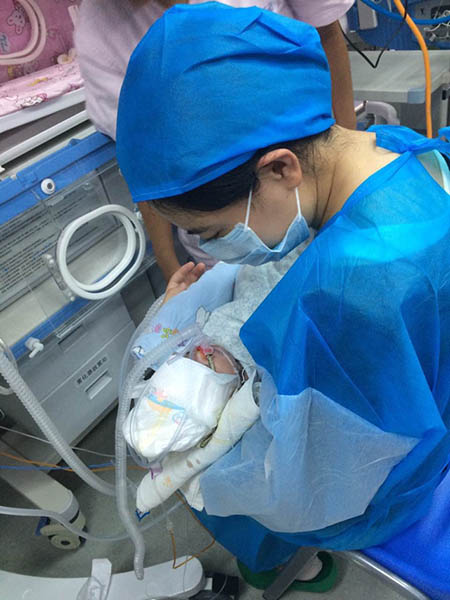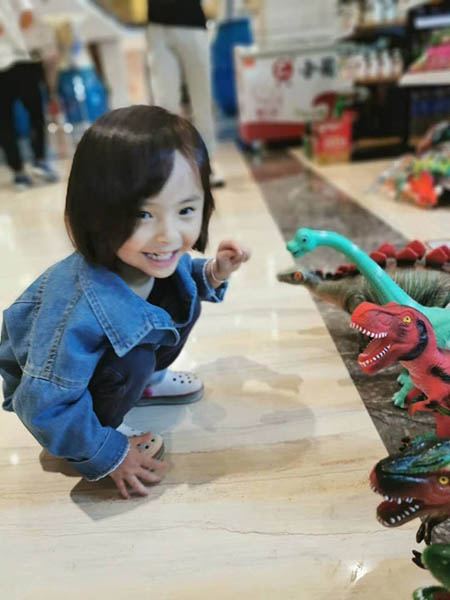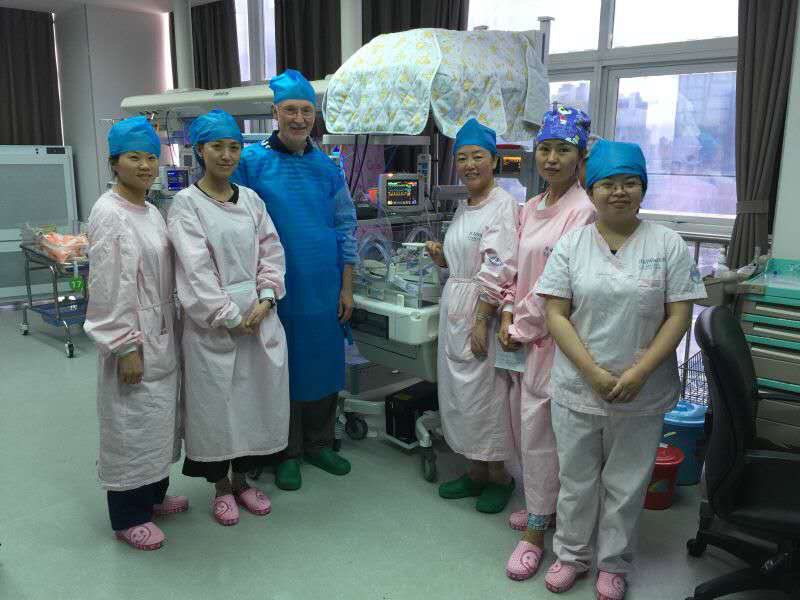Sanford Health knows children around the world matter — not just those who live in the health care system’s Upper Midwest network.
The Sanford World Clinic initiative aims to help provide children and their families with better access to primary health care, working with partners in areas as far-flung as Ghana, Costa Rica and China.
Sanford learns how best to work with people in another culture while sharing its expertise in areas ranging from specialty medicine to electronic medical records.
Kunming, a city of more than 6 million in the southwestern part of China, is home to one of Sanford’s pediatric partnership clinics. The clinic, for outpatients, is part of the new Calmette International Hospital.
Dr. Dennis Stevens, a longtime neonatologist for Sanford USD Medical Center in Sioux Falls, South Dakota, had the opportunity to make a difference personally with the tiniest and sickest of babies born in Kunming after he had first visited with a Sanford Health delegation in fall 2015.
Dr. Stevens, who recently retired, spent nearly 40 years working with babies in the neonatal intensive care unit in Sioux Falls. He wasn’t a primary care provider for all of the babies, but because they need round-the-clock care, he believes he was involved with the care of nearly all of them.
“I probably, in one way or another, touched 25,000 babies,” estimated Dr. Stevens, who served as director for the NICU for five years, worked in research and served on the faculty of the University of South Dakota Sanford School of Medicine.
So, experience he has. And when Dr. Stevens received an offer from the Calmette hospital to serve as a consultant in the NICU for a month in spring 2016, he embarked on a new experience that proved rewarding and enriching — for him and the hospital.
NICU differences in Kunming
Dr. Stevens discovered key differences between the NICU in China and his home NICU.
NICU babies at Calmette were cared for by pediatricians, not neonatology specialists. And the pediatricians received their training via an apprenticeship of sorts in the hospital rather than through a formal residency program.
“My job was to go there and try to upgrade their knowledge to be able to do better care for preterm babies,” Dr. Stevens said.
At the time he went to Kunming, babies who were born at less than 28 weeks or who weighed less than 2 ¼ pounds had a poor survival rate. “The preterm survival rates were very similar to what they were in the U.S. when I became a neonatologist in 1980,” Dr. Stevens said.
“I wanted to introduce them to being able to do more aggressive care of small preterm babies.”
Parents in Kunming were allowed to see babies in the NICU for only a few minutes each week, likely for infection control, compared to unlimited visitation at Sanford Health.
And while equipment existed, clinicians sometimes lacked experience using it or didn’t have access to it. Without a respiratory therapist in the NICU, ventilators were set up and run by the pediatricians, who might not be familiar with all of the proper settings. Some tests weren’t available at night. They couldn’t do ultrasounds of the head or heart in the NICU; those ultrasounds were available in radiology or the adult cardiology clinic.
“The pediatricians in many respects were trying to achieve state-of-the-art NICU care, but without resources,” Dr. Stevens said.
“I was so impressed the physicians were all well-intentioned. They wanted the best for the babies. They wanted to do the best things. They didn’t always know what that was, but they were always interested, on top of it, trying to make the right decisions, trying to go the right directions.”
Consulting routine
Dr. Stevens and his wife, Rita, moved into an apartment near the hospital for the month that they lived in Kunming. Rita helped hospital staff practice their English and also visited elementary classrooms during her stay.
Dr. Stevens, meanwhile, walked to work and did rounds in the NICU in the morning, accompanied by a translator. He worked closely with a Calmette pediatrician, Dr. Li Liang, who would plan which babies he would see each morning — unusual cases, or especially sick babies, or babies the pediatricians had questions about.
After lunch, they might see more babies at Calmette, or at an older hospital in Kunming. He occasionally received a request to consult on the pediatrics floor as well.
Once a week, Dr. Stevens would give a lecture about a topic of interest to the pediatricians.
Dr. Stevens, who helped the pediatricians gain a greater understanding of ventilator settings, held a workshop on that one afternoon.
He found himself welcomed warmly by the people he worked with. “They were very kind,” he said. They reflected the goodwill he had, too.
“My personal campaign was, first of all, to try to get along with everybody, which was kind of a big deal. It was a big deal to me to go there,” Dr. Stevens said.
“I didn’t want to put up a wall that was going to make it difficult to accomplish what we needed to.”

One tiny baby
Dr. Stevens’ consultation didn’t end after that month in China. The relationships he built with the pediatricians continued in the form of texted medical questions, often from Dr. Li. She sent him lab work, X-rays and baby pictures, too, that he could use to make recommendations or ask further questions.
One day, Dr. Li texted Dr. Stevens about a very sick baby girl on a ventilator. The baby, Quin Tong, weighed just 1 ½ pounds. That day, they communicated a lot about ventilator settings, antibiotic coverage and other issues about that baby and two other sick babies who had just been admitted.
She updated him periodically about the tiny baby until Dr. Stevens traveled to Kunming a month later for a weeklong conference. When he arrived, the outlook for the baby was quite poor, the hospital staff believed. When Dr. Stevens saw the baby, he was troubled by some things and asked Dr. Li to go through the details of the baby’s care with him.
As a neonatologist, Dr. Stevens was able to add an experienced perspective to observations the pediatricians had made. For example, seizures in the baby had led the doctors to think she had a hemorrhage in her brain, though they had no evidence of that. But Dr. Stevens said an effect of the sedative she was given could be causing seizure-like movements. He talked through some other issues as well that weren’t necessarily as bad as the doctors thought and helped make a new care plan.
‘Like a miraculous thing’

Quin Tong was doing better by the time Dr. Stevens left Kunming, and he left doctors with a plan to help wean the baby off the ventilator.
“And as it turned out, she survived and went home to her parents and really has done very well — now is a healthy 3-year-old and is thriving,” Dr. Stevens said. He continues to get pictures and updates about her.
“It was a great opportunity, with their permission, to demonstrate to the pediatricians what’s possible.”
Dr. Stevens said he doesn’t typically use the word “miracle,” but this baby is a special circumstance. “It was almost like a miraculous thing that that little one survived. Very extremely gratifying. … That epitomizes what is so fascinating about that whole experience.”
One change Dr. Stevens routinely encouraged didn’t happen until another visit to Kunming, while he helped with an accreditation site visit by the Joint Commission International. All along, Dr. Stevens had advocated for parents to be allowed much greater access to the NICU.
“They almost identified my name with, ‘Let the parents in,’” he joked.
The policy of unlimited parental visitation went into effect the day of the site visit, Dr. Stevens said.
By then, the staff also had taken what they had learned from Dr. Stevens about respirator management and considered how to get babies off ventilators sooner, too.
Dr. Stevens is grateful for the opportunities he has had to help the Kunming NICU. The staff there learned from his expertise, but Dr. Stevens learned something, too.
“My learning went beyond the medicine. I have to say that what you learn in doing things like that is the inherent goodness of people everywhere.”
Learn more
- Sanford World Clinic offers access to quality care in Ghana
- Podcast: World Clinic makes lasting health care changes
- Sanford inspires drive-thru COVID-19 testing in Costa Rica
…
Posted In Children's, Sioux Falls, Specialty Care, World Clinic
